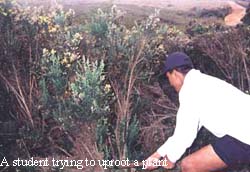
24th December 2000
Front Page|
News/Comment|
Editorial/Opinion| Business|
Sports| Mirror Magazine

![]()
Dazzling
By Yvonne Gulamhusein
Diamonds are forever, they say. Lady Hilton members treated to a showing of exclusive jewellery would certainly have agreed when they watched elegant models display these stunning creations at their Christmas dinner earlier this month.
Golay Buchel of Switzerland presented South Sea pearls, while Careem Jewellers had a collection of diamond and precious stone jewellery.
Six svelte Thai models glided down the ramp dressed in striking Thai silk and brocade to show off the jewellery to best advantage. The dresses were from Swarovski, Thailand.The show was choreographed by Geraldine Bandaranaike with Ramani Fernando Salons handling their hairstyles.
Young singer Shalika Markar also entertained the audience.
Deflowering the Plains
On a mission to rid Horton Plains of the invasive gorse, young Hoteliers face an uphill struggle
By Ruhanie Perera
 The
tiny, yellow flowers are in full bloom, stretching like a starry carpet,
as far as the eye could see. Long accepted as part of the vegetation of
Horton Plains by most visitors, the gorse plant is now however, being seen
in a different, more dangerous light.
The
tiny, yellow flowers are in full bloom, stretching like a starry carpet,
as far as the eye could see. Long accepted as part of the vegetation of
Horton Plains by most visitors, the gorse plant is now however, being seen
in a different, more dangerous light.
Unbelievable though it may seem, it is now viewed by environmentalists as a killer plant. According to H.D. Ratnayake, Deputy Director, Research and Training of the Department of Wildlife, the gorse bush is an exotic plant that thrives in a high altitude and is widespread in the Nuwara Eliya region. "The danger is that our plants can't fight it, so it virtually invades our grassland. Also since it's not palatable, our herbivores are deprived of their feeding grounds," he says.
Late last month 44 students and three lecturers from the Ceylon Hotel School made their way to Horton Plains on a mission to rid Horton Plains of gorse.
"The idea for such a project came from one of our lecturers," says Hashantha Fernando, president of the Student Welfare Association. "Kanchana Nanayakkara, our master-in-charge felt that instead of organising the usual fun activities we should use our resources to do something for the environment." So as young hoteliers, the students of Basic Level 145 decided to do their bit to protect the environment. As Hashantha puts it, "In the association, our objectives revolve around the school, society and the environment. By taking on an eco-tourism project we were fulfilling our objectives. Since we come under the Ceylon Tourist Board we naturally chose to preserve a landmark tourist attraction."
"We went to the Department of Wildlife with our ideas," says Omal Kaluarachchi, editor of the association, "and they suggested that we go to Horton Plains since there was a great need to get things started there."
Before the team of students left for Horton Plains, they did their research and decided on their plan of action. But it was only when they got there that they realised the enormity of their task. Says Omal, "The bushes were widespread, covered with thorns and had very strong roots. We couldn't use chemicals, nor could we burn them. Since Horton Plains is a protected area, they had to be uprooted with the few tools that were provided by the Wildlife Department. Finally dividing into two groups we aimed to uproot three plants an hour. But at the end of the day we had managed to uproot nearly 30."
It was only during this exercise that the boys realised just how much the once alien gorse bush had taken over the area for many visitors stopped to inquire why they were destroying the natural habitat. "Once we filled them in they were all too willing to lend a hand," laughs Omal.
At the end of two days the students had cleared a sizeable area. "But we'll never complete it on our own," says Hashantha. They are, however, determined to carry on with their research on the plant and also have a special area demarcated for them so that they can concentrate on clearing a stretch at a time.
"Our greatest satisfaction comes from knowing that by making people
aware of this, hopefully they'll follow suit and volunteer to help as well.
There was a lot of team spirit and that's the reason why the project has
been so successful," says Mr. Nanayakkara.
From 'semi-weed' to aggressive
According to botanist, Bhathiya Sumithraarachchi, the Gorse plant (scientific name Ulex Europeus) was introduced to Sri Lanka by the British as an ornamental plant, although even at that time it was a recognised as a "semi-weed" in Europe. Through generations of production, the plant having adapted to local climatic conditions has now become stronger and within the past ten years has spread rapidly. It is now at the point at which it is deemed an 'aggressive weed'.







![]()
Front Page| News/Comment| Editorial/Opinion| Plus| Business| Sports| Mirror Magazine
Please send your comments and suggestions on this web site to

